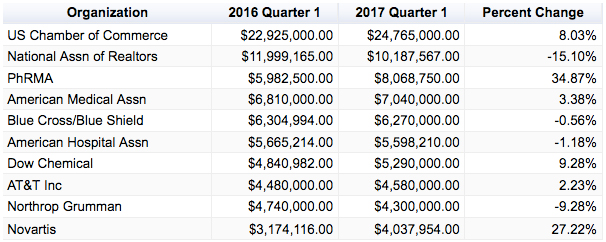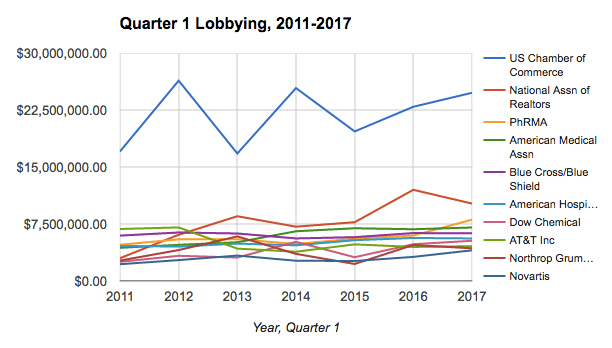
With President Trump’s 100th day looming, he’s struggled to check off some of the big initiatives on his to-do list, such as getting rid of Obamacare and overhauling the tax code. These hefty projects invite companies and other groups with something at stake to frantically lobby the government, hoping the legislation can turn in their favor.
Eight high-rollers stayed in the top 10 spenders list from last year, with some jostling among the ranks. In addition, AT&T and Novartis joined the top spenders, after being No. 11 and 22, respectively. The US Chamber of Commerce and National Association of Realtors predictably stayed at Nos. 1 and 2, with the business federation spending $24.8 million, almost $2 million more than in the same quarter of 2016, and NAR at $10.2 million, about $2 million less than the first quarter in 2016. (NAR uses a filing method that includes its local and state lobbying, which is part of why it always ranks so high.)

The Pharmaceutical Research and Manufacturers of America, the drug companies’ trade group, showed the highest leap in spending by far, jumping 34.9 percent to $8.1 million from just under $6 million in the first three months of 2016. That catapulted the trade group from No. 5 a year ago to No. 3 now — and it was the biggest-spending quarter for the organization since the start of quarterly reporting in 2008.
A PhRMA spokesperson declined to discuss the surge in the group’s efforts. But after drugmakers came under harsh criticism from GOP presidential candidate Donald Trump (who said they were “getting away with murder“) as well as many in Congress in 2016 for its pricing policies, the trade group in January began spending tens of millions of dollars in a “Go Boldly” television ad campaign touting industry breakthroughs in science and indicated it would mount an extensive lobbying campaign. Its new lobbying report indicates it weighed in on a wide range of issues, including provisions dealing with intellectual property, reimportation, the drug approval process, nominations to lead the Department of Health and Human Services and the Food and Drug Administration, opioid abuse and more. It also showed that PhRMA had hired six new lobbyists, though several others are gone.
Once in office, Trump met with CEOs of major drug firms, as well as the CEO and six board members of PhRMA. In a statement after the meeting, CEO Stephen Ubl wrote “We need to reform existing laws and regulations that are currently preventing private companies from negotiating better deals and paying for medicines based on the value they provide to patients and our health care system.”
PhRMA, the American Medical Association and Blue Cross/Blue Shield seem to historically compete for spots three through five, and this quarter was no different, with all three focusing resources on the Obamacare overhaul, among other topics.
The American Medical Association rejected Congress’s attempt to replace the Affordable Care Act, stating the changes to Medicaid would threaten coverage and make it difficult for states to act nimbly. “And critically, we urge you to do all that is possible to ensure that those who are currently covered do not become uninsured,” wrote James Madara, the CEO of the trade group, to Congress.
Health insurance group Blue Cross also wrote to lawmakers in March that the proposed repeal-and-replace Obamacare bill could lead to huge losses in coverage by reworking Medicaid from an open-ended entitlement program, and asked to drop the “premium surcharge” for those who let their insurance lapse.
Dow Chemical increased its first quarter spending by 9.3 percent, investing $450,000 more in the first three months of 2017 than the previous year. Some of that may due to trade association dues related to lobbying, which must be reported.
But Dow has made itself heard on policy issues in recent weeks: The chemical company sent letters to three federal agencies asking the Trump administration to ignore government studies that found a family of pesticides made by Dow are harmful to critically threatened species, saying the studies are flawed. That appeal came after EPA Administrator Scott Pruitt rejected a petition asking the agency to ban all uses of Dow’s chlorpyrifos pesticide, one of those critiqued in the studies. Dow also listed lobbying on its proposed $130 billion merger with DuPont, one of the world’s largest chemical companies, which faces regulatory hurdles. The possible union, announced at the end of 2015, is due to encounter close scrutiny, and a little lobbying on mergers never hurts.
And Dow is working hard on being cozy with the new administration: The company gave $1 million to help fund Trump’s inauguration, and its CEO Andrew Liveris leads a manufacturing working group in the White House. (Liveris also got the pen Trump used to sign an executive order that looked to cut back government regs.)
Surprisingly, some of the biggest stakeholders in a controversial congressional resolution that Trump signed didn’t expend more this quarter than the equivalent period last year. SJR 34 blocked a Federal Communications Commission rule that intended to ban Internet service providers from selling consumer data (like your browsing history and even sensitive info) to others. Trump overturned the rule, which had not yet taken effect, using the Congressional Review Act, which also blocks other rules on internet privacy from being issued. (Here’s more detail on how this came to be and where industry money went to those who voted for the resolution.)
ISPs such as AT&T, Comcast and Verizon clearly had skin in the game, but that wasn’t evident from the spending shown in their lobbying reports. AT&T (always a top lobbying spender and No. 8 in the first quarter) only spent $100,000 more in 2017’s first three months compared to the same timeframe in 2016. (Though AT&T ranked No. 11 last year this quarter, so the company did increase among the ranks.) Comcast saw no change, and Verizon actually decreased its spending, from $3.6 million to $2.9 million. All three of the companies in various ways listed internet privacy as a topic of concern.
For more on how these persuasive powerhouses have shifted their spending over the years, check out our chart below:

Senior researcher Dan Auble contributed to this report.
Join us in defending the truth before it’s too late
The future of independent journalism is uncertain, and the consequences of losing it are too grave to ignore. To ensure Truthout remains safe, strong, and free, we need to raise $47,000 in the next 8 days. Every dollar raised goes directly toward the costs of producing news you can trust.
Please give what you can — because by supporting us with a tax-deductible donation, you’re not just preserving a source of news, you’re helping to safeguard what’s left of our democracy.